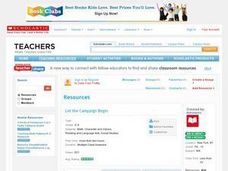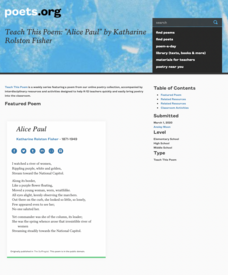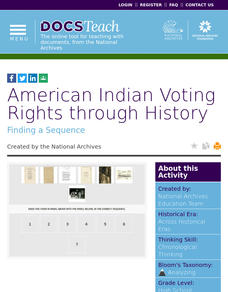Carolina K-12
How Do I Pre-Register and Vote in North Carolina?
Did you know that in some states your pupils can pre-register to vote? Teach the advantages to pre-registering and engage the classroom in an intriguing discussion about youth voting trends. Class members participates in a live polling...
College Board
Civic Knowledge and Action: Voter Registration
What does the data say? Using provided voter data from the 2016 presidential election, scholars describe the data and identify questions they could answer by analyzing it. Learners then construct tables and use them to determine whether...
Global Oneness Project
Repairing the Fabric of Democracy
During elections, headlines constantly lament the issue of low voter turnout. Help class members understand why this is such an important topic with relevant articles, a discussion of both sides of the issue, and a reflective essay.
Heritage Foundation
Voting and the Constitution
How difficult was it for everyone to get voting rights? Understanding voting rights and the fight to get them for everyone in the United States can be tricky for some learners. However, they are clarified after engaging in the...
Annenberg Foundation
Electoral Politics
You won't just get a lesson plan when you click on this resource. As you click on the related resources located to the left of the screen, you'll find, a professional development video, teacher/student notes, lesson plan, and related...
Alabama Learning Exchange
African American Civil Rights Movement
An excellent resource defines the African-American Civil Rights Movement from the early 1900s through the legacy left in modern times. Every major date, event, and key player is described under clear overarching categories. The NAACP,...
Curated OER
Qualifying to Vote Under Jim Crow
Literacy tests, poll taxes, grandfather laws? Scholars study the systematic ways African-Americans were kept from voting even after it was made a law. They analyze a series of primary source documents, complete a worksheet, and engaged...
Curated OER
Let the Campaign Begin
Students examine the many steps involved in the electoral process. They examine past president's campaigns and write an announcement speech for the candidate of their choice.
Curated OER
May The Best Character Win
Students examine the financial committment to running a campaign. They discuss the difference between electroal and popular votes. They realize how involved a political campaign is!
PBS
Voting Rights History
Why is voting so important, anyway? Learn more about the importance of exercising a right for which many men and women marched, fought, and legislated with an interactive timeline activity.
City University of New York
Analysis Worksheet: The Supreme Court Declares that the Constitution Does Not Protect Women's Right to Vote
In this voting rights instructional activity, students read instructor-assigned pages about the Supreme Court decision that women did not have the right to vote and then respond to 3 short answer questions.
US House of Representatives
Legislative Trends and Power Sharing Among Hispanic Americans in Congress, 1977–2012
Bilingual education, voting rights, and Congressional redistricting come up often in the news. Explore these topics from another view—the perspectives of Hispanic members of Congress. Activities include an article with comprehension and...
US House of Representatives
“‘The Negroes’ Temporary Farewell,” Jim Crow and the Exclusion of African Americans from Congress, 1887–1929
Despite some advances made during the Reconstruction Era following the Civil War, the period from 1887 through 1929, African Americans serving in Congress suffered severe setbacks due to Jim Crow Laws and voter suppression. Class members...
Carolina K-12
Compulsory Voting
Should voting in the United States be compulsory? In 2004, fewer than 60 percent of eligible voters cast ballots in the American national elections. After reviewing arguments for and against compulsory voting, your young citizens will...
C3 Teachers
Call for Change: What Did It Take for Women to Be Considered “Equal” to Men in New York?
An inquiry-based lesson challenges fourth graders to examine who had voting rights in New York when it was founded, women's roles, and how they entered politics. Scholars participate in thoughtful discussions and show what they know...
Carolina K-12
The Electoral College
Put the Electoral College into perspective with a simulation of an election. Scholars experience an electoral vote, participate in an in-depth discussion on the topic, and engage in a congressional committee where they learn about the...
Carolina K-12
The Twenty-Sixth Amendment and the Power of Youth
Empower teenagers to take political matters into their own hands! After completing an engaging warm-up activity, class members discuss both sides of the youth voting issue, learn about the connection between military history and the...
Read Works
The What and Who of Elections
As citizens living in the United States, it is our civil duty to vote. But how does the voting process work? After reading a five-paragraph passage on the basics of elections and voting, young constituents respond to 10 questions based...
Academy of American Poets
Teach This Poem: "Alice Paul" by Katharine Rolston Fisher
Powerful women need not look like Wonder Woman. After writing a paragraph about a strong woman they know, young scholars examine images of Alice Paul and then do a close reading of Katharine Rolston Fisher's poem "Alice Paul." Finally,...
K20 LEARN
Government and Your Right To Vote: Voting Rights In America
Gaining voting rights was difficult over the course of decades, but the debate over who should actually be allowed to cast a ballot remains. Scholars explore the history of the struggle, including the fifteenth and nineteenth amendments,...
PBS
Compare State Voting Laws Today with Laws of the Jim Crow Era
Georgia's law S.B. 202 is at the center of a lesson that asks young scholars to examine what critics say are Georgia's attempts to limit voting access to Black voters. Groups then investigate the voting laws in their own state, as well...
Franklin D. Roosevelt Presidential Library & Museum
Voting and Participation in Decision Making
"If you don't vote - you don't count." That's the big idea in this resource about voting and participation in the democratic process. The three included activities focus students on being informed voters, practicing voting for their...
DocsTeach
American Indian Voting Rights through History
Vote ... it's your right! An enlightening lesson examines the history of voting rights for Native Americans. Leaners analyze primary documents and place them in chronological order. Academics also create a list of other events that took...
DocsTeach
Analyzing a Letter to Congress About Bloody Sunday
The brutality of Bloody Sunday—when non-violent protesters who supported voting rights for African Americans were beaten by police—captured a nation. Young historians examine the letter of one horrified American to Congress to consider...

























